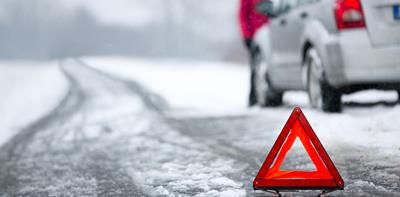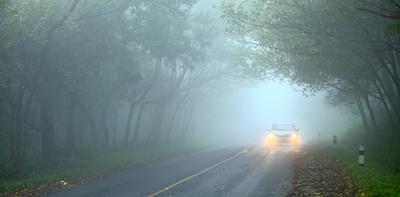
Whether it’s that last commute home after finishing work for Christmas or a long drive with a loaded car to stay with family, it’s worth taking some extra precautions to stay safe on the roads at Christmas time.
After all, it’s a busy time of year and the wintry weather can make conditions all the more treacherous.
Suzy Charman, executive director at Road Safety Foundation (RSF), says: "When you are driving home for Christmas it’s worth being mindful of adverse weather, reduced hours of daylight, and that the journeys you and others are taking may be unfamiliar. Each of these aspects could contribute to increased risk."
Before setting off for any long drive, read our tips to make your journey safer and less daunting.
1. Prepare your car
If you’re used to short distance journeys, you might not have thought to give your car the once over before you set off. But a few minutes’ maintenance at home before a long drive could save you the delay of a roadside breakdown.
Pop the bonnet and check your car’s oil, water and coolant levels. Also test your tyre pressure and tread depth and make sure all of your lights are working.
And if one of those worrying symbols on your dashboard does light up, brush up on what they mean – some of them mean you have to seek assistance right away. Test how much you already know with our dashboard lights quiz.
2. Don’t run out of juice
Always check you have enough fuel to make it to your next pit stop. It might sound obvious, but over 800,000 Brits a year run out of fuel before making it to their destination. It might be tempting to keep ploughing on, but if you don’t plan ahead, it’ll be a long walk back to the pumps.
3. Don’t drive when you’re tired
Plan your journey so that you’ll be travelling at a time when you would normally be awake and alert. Driving when you would normally be asleep is particularly risky as there is a much greater chance your circadian rhythms (essentially your body clock) will take over and cause you to drift off during your journey.
Obviously, the longer or more monotonous your drive, the less alert you become. So taking a short break at the services to stretch your legs and grab a coffee will help to keep you alert and aware of your surroundings. A good rule of thumb is to take a 15-minute break every two hours. Get a good night’s sleep in before the trip too and always stop if you start to feel tired.
If you’re not travelling alone, consider taking turns with another driver. Just check in with your insurer first to find out if your companion is covered to drive your car.
4. Don’t avoid motorways
There’s nothing extraordinary about motorways. In fact, they’re pretty dull. They’re also much safer than some urban myths would have you believe. In the UK, motorways are the lowest risk part of the road network. Also, because they are given a high priority by government due to their importance in connecting the country, you’ll find motorways are well maintained and regularly gritted.
5. Plan your route
Driving on unfamiliar roads can be daunting for some drivers. Looking out for road signs, speed limits and street names can add to the fluster of a long drive. But taking a few minutes to map out your journey with a route planning app can help you visualise what to look out for.
You might also want to research alternative routes in case of traffic or road closures. And some roads are riskier than others when it comes to serious accidents. You can check the risk rating of the roads you use with our interactive Dangerous Roads Map.
Dangerous Roads Map
Find out the safety risk for the roads that matter to you.
6. Fit dash devices properly
If you’re using a sat-nav or your smartphone to give you directions as you drive, make sure it’s fitted to your dashboard securely and that it doesn’t obscure your view of the road. By law, no part of a device should intrude more than 10mm into the area centred on the steering wheel or 40mm into the area swept by your windscreen wipers.
When fitted properly, dashboard devices, like dashcams, could help you if you have an accident and need to make a claim. Here's more about how dashcams work.
7. Avoid drinking the night before
Make sure you don't drink too much the night before and can be sure that you are safe to drive by the morning. Alcohol can stay in your system for longer than you realise, particularly if you’ve not eaten much alongside it.
Even if you are under the legal limit by the morning, the tiredness associated with drinking the previous evening won’t put you in good stead for a long drive.
8. Know your signs
You probably know your route to work, and the rules of local roads, like the back of your hand. But long distance driving inevitably means taking roads that are new to you, meaning you’ll rely on reading road signs more than ever.
This might not be as easy as you think. Only 3 in 1,000 British adults knew the meaning of all 15 road signs in our quiz. If you’re not sure what the sign for ‘no overtaking’ is or how to tell if a road is ‘one way’, you might want to revisit the Highway Code for a refresher.
9. Pack an emergency kit
In case you find yourself stranded on the roadside, make sure you’ve packed some essentials while you wait for assistance, including:
- Mobile phone and power pack
- Ice-scraper
- Warm clothes, a blanket and practical shoes
- Torch and batteries
- Water and snacks
- Shovel (in case of snow!)
No £25 admin fee
When you update your policy online, e.g. amend driver, address or car details.

